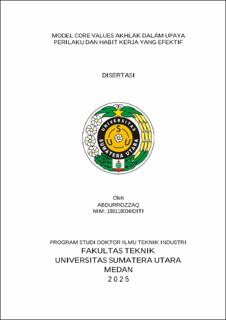| dc.description.abstract | This study aims to develop and test a conceptual model of the influence of Core Values
AKHLAK (Amanah, Competent, Harmonious, Loyal, Adaptive, and Collaborative) on the
formation of work behavior, work habits, and their impact on organizational performance
within state-owned plantation enterprises (BUMN), particularly at PTPN IV. The research
employs a mixed methods approach, combining quantitative analysis using Structural
Equation Modeling-Partial Least Squares (SEM-PLS) with qualitative reinforcement
through in-depth interviews.
The results indicate that all tested paths in the model are statistically significant. Core
Values AKHLAK have a strong influence on Work Behavior (β = 0.676; T = 8.003) and
Work Habits (β = 0.399; T = 2.507). Work Behavior significantly affects both Work Habits
(β = 0.376; T = 2.309) and Organizational Performance (β = 0.373; T = 2.704).
Furthermore, Work Habits show a significant contribution to Performance (β = 0.446; T =
3.196). The indirect paths (mediation effects) are also significant, including AKHLAK →
Behavior → Performance (β = 0.254; T = 2.142) and Behavior → Habits → Performance
(β = 0.168; T = 2.084). These findings confirm that AKHLAK values shape organizational
performance through behavioral transformation and the formation of productive work
habits.
The study affirms that systematically internalized AKHLAK values can foster positive
work behavior and productive routines, ultimately contributing directly to improved
organizational performance. This research offers theoretical, empirical, and practical
contributions to the strengthening of value-based work culture in state-owned enterprises
within the plantation sector. | en_US |


